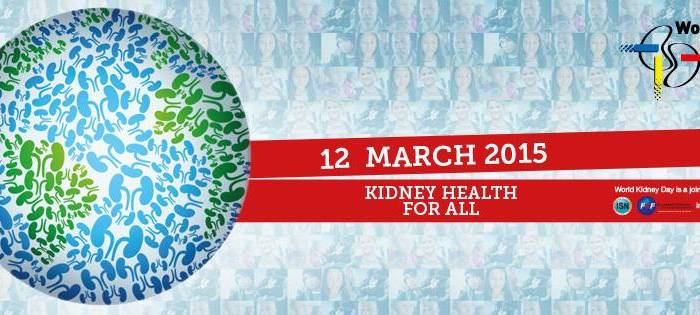By Pauline Garabedian-DeFreitas, Managing Director of Health Solutions Inc.
World Kidney Day was first pronounced in March 2006 and has been celebrated every year since, on the second Thursday of March. Today, over 90 countries not only observe this important day, but commemorate the month of March as National Kidney Month.
This global campaign is a joint effort between the International Society of Nephrology (ISN) and the International Federation of Kidney Foundations (IFKF), and has a threefold focus: to raise the profile of kidney disease; to increase awareness of the importance of our kidneys; and to reduce the impact of kidney disease and its associated problems worldwide.
Every year a new campaign slogan is created. This year’s slogan is “Kidney Health for All”, which is expected to drive awareness programmes with respect to the current high incidences and, at times, the bad outcomes of Chronic Kidney Disease (CKD) in some communities.
Kidney Facts
Kidneys are two bean-shaped organs, each about the size of a fist. They are found near the middle of the back, and are protected by the lower part of the rib cage. Most people have two kidneys, but the body can work perfectly well with only one kidney.
The kidneys are the body’s natural filtration system. They play a large role in cleaning the body’s blood and removing waste and excess fluid in the form of urine.
The kidneys help with regulating blood pressure — producing a hormone that promotes the formation of red blood cells and producing vitamin D to help keep the blood, heart, bones and teeth healthy.
They also regulate the electrolyte levels (e.g. sodium and potassium) and the chemicals (e.g. calcium, magnesium and phosphate) in the your body
Who is at risk of Chronic Kidney Disease (CKD)?
The two primary causes of kidney failure are: Type 2 Diabetes (Non- Insulin Dependent); and Hypertension (high blood pressure).
People who have Type 2 diabetes are at a higher risk of getting CKD. In fact, it is the number one cause of kidney failure. However, having Type 2 diabetes does not mean you will experience kidney failure.
Good blood pressure and blood sugar control can help prevent the occurrence of CKD. Tight control of blood sugar levels will also protect blood vessels, limbs and eyes.
Hypertension (high blood pressure) places extra stress on all the blood vessels, including the tiny, fragile kidney filters known as nephrons. Hypertension is considered the second major cause of kidney failure.
In addition to the above, some other factors that can cause or contribute to kidney failure are a family history of kidney disease, certain diseases such as sickle cell anemia, systemic lupus erythematosus, glomerulonephritis (inflamed kidney filters), overuse of painkillers and allergic reactions to antibiotics.
Help Spread the Message
In More Developed Countries (MDCs) of the world, many persons are fortunate to have medical coverage to treat kidney disease and/or failure, and provide renal replacement therapy and/or kidney transplant. Less developed countries (LDCs), however, are at a higher risk given their socio- economic standards and cultural practices.
Because of this, the health implications are of greater concern in LDCs, where treatment is either non-existent or where the high treatment costs limit availability. This too often results in the death of young CKD patients or cause them to relocate to seek medical treatment.
That is why, given our situation here in St. Vincent and the Grenadines, that we at Health Solutions Inc. encourage all citizens to: spread the message, understand the facts about the kidneys, highlight that diabetes and high blood pressure are the key causes of CKD and take preventative measures into consideration; and encourage all medical professionals to have in place a systemic screening for CKD of all patients who have diabetes and/or hypertension and, once diagnosed, to be monitored closely to slow down disease progression.
So, remember, let our kidneys be our concern during this National Kidney Month and throughout the year.






